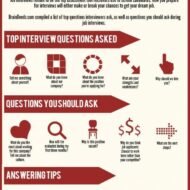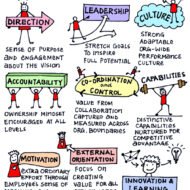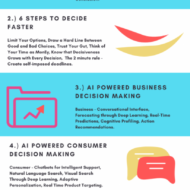Posted by Managementguru in How To, Human Resource, Interview Questions, Organisational behaviour, Stress Management
on Jun 21st, 2014 | 0 comments

A job interview can be viewed as a mutual “exchange of information” because it provides the candidate with an opportunity to both gain information about the department and position, and to discuss his/her own skills, and career goals in relation to the job. Interviewing helps managers determine three things before they make a hiring decision. 1. Can you do the job? 2. Are you motivated to do the job? 3. Are you a good fit in the organization? Acing yourself is an important part of the interview process. The time you spend gearing up before the interview will be time well spent in your job search process. The following are some tip-offs on what you can do to prepare yourself before, during, and after a job interview. Before the Interview Assess the Job Specification and Position Description Review your résumé and be prepared to discuss your appropriate skills. Decide who your references are. A current or past manager, coworker, teacher/professor or associate may come in handy to vouch for your skills/accomplishments. Be ready with extra copies of your résumé Dress for Success -Appearance should display maturity and self-confidence. Be neat, clean, and dress in good taste. Find out where the interview will be, obtain clear directions, and confirm the time. Plan to arrive 10- 15 minutes early. During the Interview Relax! Think of the interview as a conversation, not a cross-examination Be whole-hearted, self-assured, polite, and open. Listen to the questions carefully and give clear, crisp, and precise answers. Convey interest in the organization and knowledge of the position. Ask relevant questions about the job or department. Present a list of your references and any letters of recommendation or reference that you may have to offer. End the interview with a firm handshake and thank the interview panel for their time and consideration. After the Interview Send a crisp thank-you letter within 24 to 48 hours of the interview. Reiterate your interest in the position; mention the key skills you know that strengthen your place in the organization, and your contact information. If you are not chosen for the job, it is OK to graciously accept your defeat and ask the interviewer which area(s) you could improve on in the future!...

Posted by Managementguru in Human Resource, Interview Questions, Strategy, Training & Development
on May 30th, 2014 | 0 comments

How Do You Answer the Job Interview Question – What is Your Greatest Strength “If you fail to prepare, then be prepared to fail”- This saying hundred percent fits the rule of the game when it comes to job interview. Spade-work is absolutely essential: – about the company in which you are seeking a position, key members involved in the making of the company, the culture and other prospects. FIQ’s of JIQ’S: Let us look at some of the common and frequently asked questions in interviews and try to understand what the interviewer expects your answer to be. Try to gauge the underlying purpose of the question in relevance to the job being applied for and please also realize the fact that interviews are acid-tests to estimate your personality as a whole; not simply your knowledge, skills and experience. What do they mean by strength? Strength is nothing but what you are good at. Say, you might be good at singing, you might be good at ballet dancing, and you might be good at even eaves-dropping! But is it a pleasant or an appreciable attribute to be discussed when it comes to your job interview? Always remember when asked about your strengths, you have to pin-point the qualities that are needed to complete the task you might be assigned for, in case you are selected. Everything in relation to the job position you are trying to acquire. Understand Employers’ Perspective and Satisfy Their Expectation: Neither be blunt nor blatant, try to give a big picture of all your experiences in the previous jobs as an impressive package and make the interviewer feel that you will definitely be an asset to the company. If it is a sales manager position, you might want to explain precisely how you completed your sales targets ahead of time, how you increased the growth rate of your company in a time-bound fashion and how you pulled your team through tough situations. If you are naturally good at communicating, no probs, but if not, it is better to have a list mentally prepared of your greatest strengths prior to an interview. By communicating, I don’t mean to say talking but making your point noted or reaching across. If you are a fresher, you have nothing to lose by being bold and assertive as it will only add to your experience. All mistakes are experiences which teach us “how not to perform a task” or “how not to behave in a particular situation”. Here is a list of the 10 most desirable traits that all employers love to see in their employees: A proven track record as an achiever…especially if your achievements match up with the employer’s greatest wants and needs. Intelligence…management “savvy”. Honesty…integrity…a decent human being. Good fit with corporate culture…someone to feel comfortable with…a team player who meshes well with interviewer’s team. Likeability…positive attitude…sense of humor. Good communication skills. Dedication…willingness to walk the extra mile to achieve excellence. Definiteness of purpose…clear goals. Enthusiasm…high level of motivation. Confident…healthy…a leader. Courtesy – http://dev.fyicenter.com Not everybody has all these qualities imbibed in them; it all lies in your expression of interest to learn those qualities which you are slightly lacking and enhance those qualities which you are already good at. It is that spark of enthusiasm makes you all different and more prospective than your competitors. With this question, the interviewer seeks to find out if: • Your strengths align with the company’s needs • You can do the job and perform like a rock star • You are the best person for the job — no need to hold out for someone better • You have...

Posted by Managementguru in Change management, Human Resource, Organisational behaviour
on May 20th, 2014 | 0 comments

Organizational Climate – An Analogy Organizational climate is a measure of the feel of the internal environment of an organization which is perceived by an outsider and/or an employee according to their business with the organization. Organizational climate has a great effect on employees’ behavior. If the climate of an organization is open and friendly, employees feel relaxed and if it is very formal, then such a comfort level may not be felt. Climate for an organization is somewhat like personality for a person. “Just as every individual has a personality that makes him/her unique, an organization has a climate that clearly distinguishes its personality from other organizations. Human religionists introduced the concept of organizational climate in the late 1940’s. Now this has become a very useful metaphor for thinking about and describing the social aspects of a firm. Some definitions: “A set of characteristics that describe an organization and that i. Distinguish one organization from another ii. Are relatively enduring over a period of time and iii. Influence the behavior of people in the organization.” – Forehand and Gilmber “A mutually agreed internal (or molar) environmental description of an organization’s practices and procedures.” – Benjamin Schneider (1975) “A relatively ending quality of the internal environment that is experienced by the members, which influences their behavior and can describe in terms of values of a particular set of characteristics of the organization.” – Renato Tagiuri (1968) Features: It is an abstract and intangible concept. But it exercises a significant impact on the behavior and performance of organization members. It is the perceived aspect of organization’s internal environment. It refers to the relatively enduring characteristics which remain stable over a period of time. It gives a distinct identity to organization and differentiates it from others. It is a total expression of what the organization is. It is the summary perception which people have about organizations. It is a multi-dimensional concept. It consists of all organizational factors – authority pattern, leadership pattern, communication pattern, control etc. Elements of Organizational Climate: Individual Autonomy: The extent to which employees are entrusted with to make decisions, the degree to which they are free to manage themselves and have the freedom to exercise their responsibility come under the purview of individual autonomy. Position Structure: It means the extent of direct supervision, formalization and centralization in an organization. Reward Orientation: The degree to which an organization rewards individuals for hard work or achievement. It will be high when an organization orients people to perform better and rewards them for doing so. Task Orientation: If the outlook of the top management is task oriented, the employees will have to speed up the pace of work to please their bosses. Relations Orientation or Consideration: Here the climate is conducive and supportive where the managers are relations-oriented while dealing with their sub-ordinates. The needs and aspirations of the workers will be given due importance resulting in enhanced team spirit. Job Satisfaction: The workers feel happy if the jobs are designed to allow the worker to use their innovative skills. Morale: Morale represents a composite of feelings, attitude and sentiments of organizational members towards the organization, superiors and fellow workers. If it is high, there will be an atmosphere of co-operation and if it is low, there will be conflicts and poor co-operation among the workers. They will also feel dis-oriented in their work. Control: The control systems may be either rigid or flexible. An impersonal or bureaucratic atmosphere is seen in the former situation where the scope of self-regulation will be minimum. DOWNLOAD THE PDF...

Posted by Managementguru in Interview Questions, Resume Samples
on Apr 6th, 2014 | 0 comments

Resume for Sales Know the purpose of your resume Need help in creating or updating your resume? It certainly can be a tough task because your resume is going to be reviewed by software as well as by hiring managers. This new column brings you top resume tips for choosing a resume format, selecting a resume font, customizing your resume, using resume keywords, explaining employment gaps, and more tips for writing interview winning resumes. Try to understand that the purpose of building your resume is to land an interview and make it as precise as possible and impress the recruiters with your profile. Business and Marketing Writing A great resume is one that highlights your strengths and emphasizes the highs of your career. It is imperative for every professional to get his resume periodically updated to move up the corporate ladder. A resume has four sections: Personal Information. This includes your full name, city, contact number, e-mail address and social media profiles. Your personal information can appear at the top center part of the resume with a header positioned below it. Employment History. Your work history must be arranged beginning from current or most recent employer. It must indicate your designation, inclusive dates of employment and a description of your scope of responsibilities. Educational Attainment. This should also be arranged according to highest level of education attained. Details should include degree earned, inclusive dates and relevant awards or achievements. You do not have to include information from secondary education and earlier. Special Skills. This section is where you highlight core competencies and other skills you have that are relevant to the job opening. What are the key ingredients of a great resume? A sparkling profile with sufficient emphasis on your key strengths. A cover letter that guarantees a personal interview. Customized and tailor-made resumes. Designed by skilled resume writing experts. Professional formatting and layout. What should be there in a profile statement? Understand that highlighting your skills and experience in your profile is the “Catch Point” to impress your new recruiters. Financial Planning and Strategy, Marketing Concepts, Positioning, People Management, Territory Management, Sales Planning, Competitive Analysis, Understanding the Customer, Product Development, Client Relationships, Creative Services are some of the criteria that make a marketing/sales manager stand out from the crowd. Try to bring out the achievements in your career till date and who might be the better master to do it other than yourself! Q: What’s the most common resume mistake? A: Making too many general claims and using too much industry jargon that does not market the candidate. A resume is a marketing document designed to sell your skills and strengths rather than just portray a bio of the candidate. For unemployed candidates, handing out resumes should be a full-time job. The majority of mid- to senior-level positions are filled through networking, so contact absolutely everyone you know in addition to recruiters who are in a position to hire you or share...

Posted by Managementguru in Business Management, Change management, Decision Making, Principles of Management, Training & Development
on Mar 31st, 2014 | 0 comments

Evaluating the Importance of Decision Making Successful decision making is one that is devoid of any ambiguity or tentativeness. Although there is a wide range of choice and alternative techniques to arrive at a decision, timely decision making is what adds value to the decision. The objective is to execute the action plan immediately to avoid delays that might prove costly in terms of productivity. Defensive behavior of managers: Managers who are the key figures to make decisions sometimes play defense to avoid action, blame or change. They exhibit a variety of defensive behaviors which is a wasted effort; this also makes the workers lethargic in their attitude. Avoiding action is considered to be the best political strategy. Some managers always talk about the rules and regulations that have been followed for ages in that company and want every action to be rigidly adhered to the precedence and neither allows nor admits the need to consider the nuances of a particular case. Policies and Procedures: Policies and procedures are of course the prerogative of the top level management, but it is the duty of the manager to suggest reforms in those policies that are obsolete by bringing it to the perusal of the ultimate authorities. How long will you sing the same song “The rules clearly state that”! Also don’t try to pass the buck or play duals, that clearly showcases your inability to handle things and nobody nowadays is prepared to believe false pretense. Expectation of Sub-Ordinates from the Superiors: Subordinates look up to their superiors for support as well as quick solutions for problems of any kind that comes their way; only a person who is quick in reacting to situations with presence of mind and consideration is well liked by and approved of. If you distance yourself from problems or try to prolong a task in lieu of your inability to make a decision, in the short run it might prove helpful in covering up making you look busy and productive. But what happens in the long run? It leads to organizational rigidity and stagnation in terms of productivity and a sag in the morale of the employees. Fifty Models for Strategic Thinking Playing it Safe is not Always Safe: Playing safe is not always safe. Some managers always like to lead a team that has taken up viable projects with a high probability of success. There is no pain but lots of gain. This tactics makes you devoid of risk taking -which according to me is the prime and supreme quality that a manager or a team leader must possess or at least try to develop. Also taking a neutral position in #conflict situations makes you a dull leader and not a person to be much sought after. What is the result of Poor Decision Making? The first and foremost thing that managers have to understand and admit is that, poor decision making is the root cause of failed course of action. They should have the guts to admit and take up the responsibility for the negative outcome and not to seek some strategically helpless defense mechanisms. Making others a scapegoat for your helplessness doesn’t shield you for long but puts you in the defending territory forever. Ddefensiveness delays decisions, affects organizational success, sets a bad precedence, increased group conflicts, interpersonal tensions and leads to unreliable evaluations. The long and short of the discussion clearly highlights the importance of recruiting not only a qualified manager but a committed and reliable person who has the ability to take risks and tackle crisis situations with ease and steer the organization smoothly without any hitches by greasing it...









